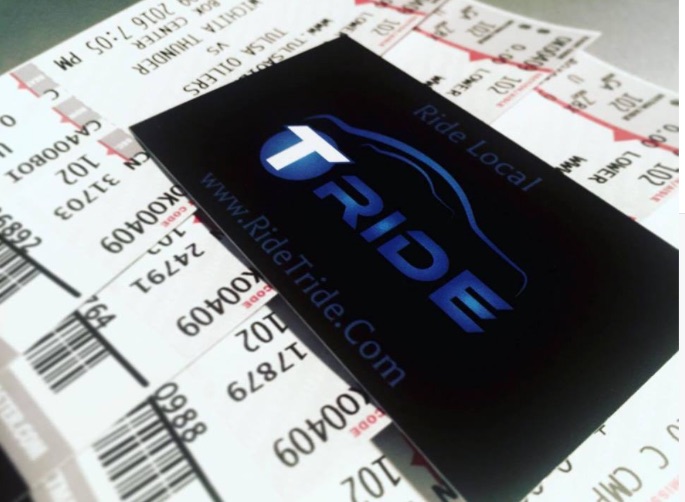
Tride is a new ride-hailing company operating in Tulsa, Oklahoma. The company is interested in the Corpus Christi market and would agree to a fingerprint background check. Courtesy photo
A new ride-sharing company might be coming to Corpus Christi, offering an alternative to Uber and Lyft. The two national transportation network companies recently stopped operations here over the passage of an ordinance requiring fingerprint background checks.
Tride, which currently operates only in Tulsa, Oklahoma, and is negotiating to do business in Midland, was asked to come and take a look at Corpus Christi.
Owner Mack Park told Corpus Christi Business News he likes what he sees of this market so far.
“We’re smaller, so we’re able to work with the smaller communities,” Park said. “We’re the little guy local grocery store versus Walmart.”
Park outlined the differences between his company and what he termed “corporate giants” such as Uber and Lyft. Tride’s rates never changeunlike the two bigger companies, which have surge pricing. Riders pay more for high demand times such as New Year’s Eve or big concerts with surge pricing.
Tride would have an office in the city and be involved in the community. One community service it provides in Tulsa is to give free rides to job interviews for military veterans and the unemployed. That practice would continue on the Coastal Bend.
Tride would also bring in a new service to the city called MoveIt. Independent pickup truck owners sign up as drivers and are on call to help shoppers transport big purchases to their homes or offices.
“It’s on-demand,” Park said. “You don’t have to rent a truck or pay a deposit or pay the store to bring it to you. It has to fit in the back of a pickup and still be secure, but you don’t have to schedule delivery. Just use the app.”
He and a partner are considering a similar service for party buses on demand.
Another difference, Park said, is his company treats its drivers better than Uber or Lyft.
“Uber will saturate the market with drivers,” he said. “We want a three-to-one ratio: one driver to three downloads. We want to make sure the driver makes a lot of money.”
Park also said Uber has a habit of lowering the rates drivers get paid — without notice. He cited Detroit as an example.
“In Detroit, overnight, they went from 90 cents to 30 cents without any input from the drivers,” he said. “They didn’t get any warning.”
Fair cuts in more than 100 cities nationwide over the past year have led to driver protests and boycotts, according to newspaper reports. Philadelphia drivers announced their intent to sue the company. Others left for Lyft or just turned off their apps.
Tride drivers have more independence and will submit to fingerprint background checks, Park said, something Uber and Lyft have agreed to only in two major markets: New York and Houston. In fact, Uber has gained a reputation as a bully in other communities that have passed fingerprint background checks.
Both companies left San Antonio over the same argument, returning only after the city approved less stringent regulations. They also left Galveston and Midland. But even after Midland dropped the background check requirement, Uber has yet to return to the Tall City.
Austin is another battlefield currently waging war with Uber. A nationwide company based in San Francisco, Uber and its supporters recently forced a referendum in the state’s capital. A vote to allow ride-hailing companies to operate without fingerprint background checks and other requirements is on the city’s May 7 ballot as Proposition 1.
Uber, which is valued at $62 billion, and Lyft, valued at $5.5 billion, have so far spent $788,750 combined on a political action committee called Ridesharing Works for Austin. The PAC has saturated local TV stations with advertising supporting the passage of Prop 1. In-kind contributions for polling, hotels and other expenses were reported at nearly $1.4 million combined.
Several Uber drivers with criminal histories that were not revealed by the company’s checks have made national headlines in the last year for rape, assault and even murder. A shooting spree by an Uber driver in Michigan in February killed six people.
The company recently settled two class-action lawsuits for $28.5 million brought against it for its claims it provides “the safest ride on the road” and employs “industry-leading background checks.”
Which is why Corpus Christi Mayor Nelda Martinez said she will not bend on that requirement.
"If something horrible happened to one of my citizens because I didn't require an extra $38 [for a fingerprint and background check], I couldn't live with myself," Martinez said at a March city council meeting.
While Park has not yet come to Corpus Christi to speak to the council, he plans to visit as soon as what he calls the city’s “discovery” phase is over in early May. The council is expected to put the issue back on the agenda for a vote sometime this month.





